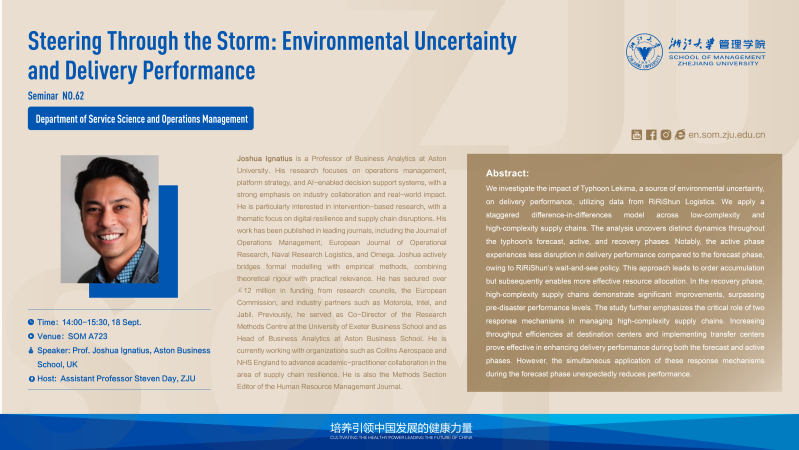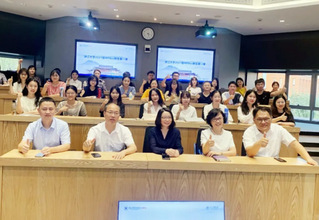Title: Steering Through the Storm: Environmental Uncertainty and Delivery Performance
Time:14:00-15:30, 18 September
Venue:SOM A723
Speaker: Prof. Joshua Ignatius, Aston Business School, UK
Host: Assistant Professor Steven Day, ZJU
Bio:

Joshua Ignatius is a Professor of Business Analytics at Aston University. His research focuses on operations management, platform strategy, and AI-enabled decision support systems, with a strong emphasis on industry collaboration and real-world impact. He is particularly interested in intervention-based research, with a thematic focus on digital resilience and supply chain disruptions. His work has been published in leading journals, including the Journal of Operations Management, European Journal of Operational Research, Naval Research Logistics, and Omega. Joshua actively bridges formal modelling with empirical methods, combining theoretical rigour with practical relevance. He has secured over £12 million in funding from research councils, the European Commission, and industry partners such as Motorola, Intel, and Jabil. Previously, he served as Co-Director of the Research Methods Centre at the University of Exeter Business School and as Head of Business Analytics at Aston Business School. He is currently working with organizations such as Collins Aerospace and NHS England to advance academic-practitioner collaboration in the area of supply chain resilience. He is also the Methods Section Editor of the Human Resource Management Journal.
Abstract:
We investigate the impact of Typhoon Lekima, a source of environmental uncertainty, on delivery performance, utilizing data from RiRiShun Logistics. We apply a staggered difference-in-differences model across low-complexity and high-complexity supply chains. The analysis uncovers distinct dynamics throughout the typhoon’s forecast, active, and recovery phases. Notably, the active phase experiences less disruption in delivery performance compared to the forecast phase, owing to RiRiShun’s wait-and-see policy. This approach leads to order accumulation but subsequently enables more effective resource allocation. In the recovery phase, high-complexity supply chains demonstrate significant improvements, surpassing pre-disaster performance levels. The study further emphasizes the critical role of two response mechanisms in managing high-complexity supply chains. Increasing throughput efficiencies at destination centers and implementing transfer centers prove effective in enhancing delivery performance during both the forecast and active phases. However, the simultaneous application of these response mechanisms during the forecast phase unexpectedly reduces performance.

欢迎广大师生积极参与!





